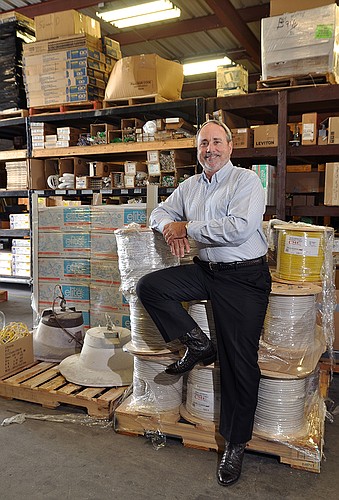Executive Summary
Company. Kirkwood Electric Industry. Construction Key. Shun debt to prepare for the next downturn.
Wayne Kirkwood knows who his friends are.
The president of Kirkwood Electric in Cape Coral, the epicenter of the housing bust, says his company survived the crash because it had paid off all its debts 10 years earlier, in 1999.
“Debt is not your friend,” says Kirkwood.
As the recovery in housing takes hold across Southwest Florida, it might pay to listen to Kirkwood's experience. “When things were booming I paid everything off,” he says.
That's not to say Kirkwood didn't feel the pain of the housing collapse. He slashed the payroll and sold half his fleet of 50 trucks. For four years, Kirkwood stopped drawing a paycheck so he could retain key employees he knew he'd need in the recovery. He has 60 employees today, down from the peak of 200 during the boom. “It was horrible,” he says.
But Kirkwood recalls his grandfather's advice: If you worry about the pennies, the dollars will take care of themselves. “I've been a cash guy most of my life,” he says.
Only the most conservative companies survived the downturn. “Most of us took no pay for a couple years just to survive,” says homebuilder Bob Knight, owner of Paul Homes who has worked with Kirkwood for 25 years. “We had luckily built up some cash reserves to survive and that made the difference.”
Knight says Kirkwood's effort to retain top people has paid off now that the recovery is underway. “You can guarantee that it's going to be done well, it's going to be done right and it's going to be done fast,” he says.
First in the Cape
The fourth generation to take over the business, Kirkwood's great-grandfather started the company in the late 1800s in Pittsburgh. Sixty years later, the business moved to Florida.
Kirkwood's grandparents bought one of the first 20 homes in Cape Coral. “My dad helped them move here in 1959,” says Kirkwood, who was 5 years old at the time.
With a degree in architecture from the University of Florida, Wayne Kirkwood took over the business in 1989. By the time the housing boom was underway he had 200 employees (Kirkwood doesn't disclose revenues.)
“The reason we survived was no debt,” he says.
Kirkwood concedes that he's always preparing for the downside. “I'm a scaredy cat,” he laughs.
Kirkwood has a good pulse on the region beyond his hometown of Cape Coral, which also helps him anticipate economic trends. He's active in economic development organizations such as Lee County's Horizon Council and the Industrial Development Authority.
“Wayne is a regional thinker,” says Knight. “It requires regional thinking to survive,” he adds.
A healthier market
Kirkwood says the housing market continues to grow at a healthy pace. At this point, he's not worried about overbuilding or another boom.
In particular, Kirkwood says speculators aren't part of the recovery. “We don't want them to be,” he says, because speculators financed the boom that led to the bust.
Homebuyers now are those who plan to live in houses, not flip to investors. “That's a healthy market,” Kirkwood says.
Labor costs have risen, but Kirkwood says lower costs of materials such as copper have offset those expenses. The economic slowdown in China has lowered the prices of many commodities, to the benefit of construction firms in the U.S.
To control costs on big jobs that may require a temporary increase in labor, he contracts with a firm in Orlando called Rams that provides electricians on a temporary basis. “Firms like that are a burgeoning resource,” he says.
Labor heats up
As the construction industry recovers, subcontractors are bearing the brunt of labor shortages.
That's because they're caught between employees threatening to leave if they don't get paid higher wages and builders who are reluctant to pay more for work they subcontract, such as electrical wiring, plumbing and air-conditioning installation.
“I can tell you that without a doubt it's the worst I've ever seen,” says Jason Schreyer, who operates Sunset Air in Fort Myers. “I quit two large builders because the margins are terrible.”
Schreyer says entry-level jobs that used to pay $10 or $12 an hour now command $15 to $16. “And you have to pay $20 to keep them,” he adds.
“Since 2013, our tile contractor labor rates are up 50%. It's been a huge adjustment,” says Kirk Fagan, vice president and general manager at Wayne Wiles Flooring in Fort Myers. “We don't foresee it stopping anytime soon,” he adds.
The problem is especially acute for skilled trades where even job postings don't garner much response, says Gary Griffin, president of B&I Contractors in Fort Myers. Griffin says the commercial subcontractor is training employees for in-demand skills such as welders and specialty plumbers. “If you have skills, your value is significant,” says Griffin.
Sometimes it doesn't take much more for an employee to walk. “It's a little cutthroat,” says Wayne Kirkwood, president of Kirkwood Electric in Cape Coral. “I can lose a guy for 25 cents to 50 cents an hour,” he says.
“Almost daily we're getting requests from employees for more money,” says Chris Graff, project manager with Florida Heat and Air. One of his service technicians left for what he says is $24 an hour at a rival company, significantly more than the prevailing wage.
The difference between what subcontractors have to pay their employees and the prices they can charge builders makes it tough to turn a profit. “We're getting killed by these numbers,” Graff says.
The problem is exacerbated because many construction workers left Florida during the downturn for booming areas like Texas and North Dakota, resulting in a lack of qualified labor for Florida's recovery. Despite falling oil prices and rising wages in Florida, those workers aren't coming back fast enough.
“We have not seen a significant number of folks from that [oil] industry back into construction, and I don't know why,” says Griffin.
Some of them may never come back to Florida. “It's not just that they're gone; they have different jobs,” says Brenda Talbert-Thomas, executive vice president of the Lee Building Industry Association.






